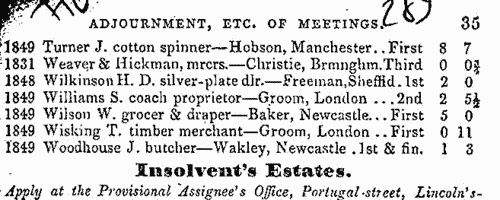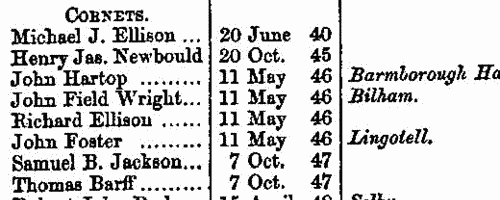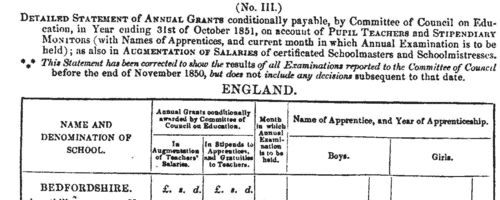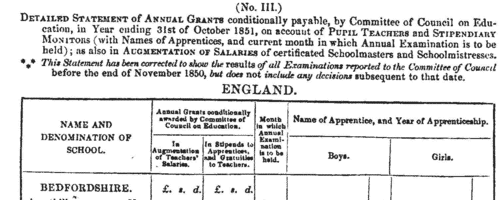Add this eBook to your basket to receive access to all 706 records. Our indexes include entries for the spelling brock. In the period you have requested, we have the following 706 records (displaying 371 to 380): These sample scans are from the original record. You will get scans of the full pages or articles where the surname you searched for has been found. Your web browser may prevent the sample windows from opening; in this case please change your browser settings to allow pop-up windows from this site. Deaths, Marriages, News and Promotions
(1850)
Death notices and obituaries, marriage and birth notices, civil and military promotions, clerical preferments and domestic occurrences, as reported in the Gentleman's Magazine. Mostly from England and Wales, but items from Ireland, Scotland and abroad.
| Sample scan, click to enlarge

| Dissolutions of partnerships in England and Wales
(1850)
Perry's Bankrupt and Insolvent Gazette, issued monthly, included lists of dissolutions of partnerships gazetted in England and Wales. The names of the partners are given in full, surnames in capitals, followed by trade and address, and date of the end of the partnership. Each entry usually ends with the phrase 'Debts by ...', indicating which partner intended to continue, and resume the responsibilities of, the business. This is the index to the names of the partners, from the issues from January to December 1850. | Sample scan, click to enlarge

| Dividends of insolvents' estates in England and Wales
(1850)
Perry's Bankrupt and Insolvent Gazette, issued monthly, included brief notices of dividends of insolvents' estates. Each entry gives the year that the insolvency was first gazetted, the surname and initials of the bankrupt, trade and address; followed by the amount of the dividend as shillings and pence in the pound. This is the index to the names of the insolvents, from the issues from January to December 1850. | Sample scan, click to enlarge

| Yeomanry and Militia Officers
(1850)
The Royal Military Calendar lists officers of the Yeomanry Cavalry and the Militia, the armed forces supporting the civil power in Britain and Ireland | Sample scan, click to enlarge

|  Criminal lunatics in Surrey
(1851) Criminal lunatics in Surrey
(1851)
The 1851 census return for the Royal Hospital of Bethlehem or Bethlem, founded by Edward VI for the cure of poor lunatics. The hospital lay in the parish of St George the Martyr, Southwark, in St Jude ecclesiastical district. The return of patients was divided into three sections: curable, incurable and criminal lunatics. This index covers the criminal. | Sample scan, click to enlarge

| Deaths, Marriages, News and Promotions
(1851)
Death notices and obituaries, marriage and birth notices, civil and military promotions, clerical preferments and domestic occurrences, as reported in the Gentleman's Magazine. Mostly from England and Wales, but items from Ireland, Scotland and abroad.
| Sample scan, click to enlarge

| Pupil Teachers in Middlesex: Girls
(1851)
The Committee of Council on Education awarded annual grants for the training and support of pupil teachers and stipendiary monitors in schools in England, Wales, Scotland, the Isle of Man and the Channel Islands. Pupil teachers started training between the ages of 13 and 15, and 'must not be subject to any bodily infirmity likely to impair their usefulness as Pupil Teachers, such as scrofula, fits, asthma, deafness, great imperfections in the sight or voice, the loss of an eye from constitutional disease, or the loss of an arm or leg, or the permanent disability of either arm or leg, curvature of the spine, or a hereditary tendency to insanity'.
They also had to obtain certificates from the managers of the school (and their clergyman, in the case of Church of England schools) as to their moral character and that of their family; good conduct; punctuality, diligence, obedience, and attention to duty; and attentiveness to their religious duties.
This detailed statement in the annual report of the committee for the year ending 31 October 1851 lists schools by county, giving:
1. Name and Denomination of School, with these abbreviations - B, British and Foreign School Society; F. C., Free Church of Scotland; H. C., Home and Colonial School Society; N., National Society, or connected with the Church of England; R. C., Roman Catholic Poor-School Committee; Wesn., Wesleyan Methodist.
2. Annual grants conditionally awarded by the committee in augmentation of teachers' salaries, and in stipends to apprentices, and gratuities to teachers.
3. Month in which annual examination was to be held.
4. Names of apprentices, giving surname and initials, and year of apprenticeship. Stipendiary monitors are indicated by (S. M.). | Sample scan, click to enlarge

| Pupil Teachers in Somersetshire: Girls
(1851)
The Committee of Council on Education awarded annual grants for the training and support of pupil teachers and stipendiary monitors in schools in England, Wales, Scotland, the Isle of Man and the Channel Islands. Pupil teachers started training between the ages of 13 and 15, and 'must not be subject to any bodily infirmity likely to impair their usefulness as Pupil Teachers, such as scrofula, fits, asthma, deafness, great imperfections in the sight or voice, the loss of an eye from constitutional disease, or the loss of an arm or leg, or the permanent disability of either arm or leg, curvature of the spine, or a hereditary tendency to insanity'.
They also had to obtain certificates from the managers of the school (and their clergyman, in the case of Church of England schools) as to their moral character and that of their family; good conduct; punctuality, diligence, obedience, and attention to duty; and attentiveness to their religious duties.
This detailed statement in the annual report of the committee for the year ending 31 October 1851 lists schools by county, giving:
1. Name and Denomination of School, with these abbreviations - B, British and Foreign School Society; F. C., Free Church of Scotland; H. C., Home and Colonial School Society; N., National Society, or connected with the Church of England; R. C., Roman Catholic Poor-School Committee; Wesn., Wesleyan Methodist.
2. Annual grants conditionally awarded by the committee in augmentation of teachers' salaries, and in stipends to apprentices, and gratuities to teachers.
3. Month in which annual examination was to be held.
4. Names of apprentices, giving surname and initials, and year of apprenticeship. Stipendiary monitors are indicated by (S. M.). | Sample scan, click to enlarge

|  Residents of Willow Street, Westminster
(1851) Residents of Willow Street, Westminster
(1851)
In the 1851 census, Westminster superintendent registrar's district, St Margaret's registrar's district, enumeration district 20 comprised part of St Margaret's parish and St Stephen's ecclesiastical district in the city of Westminster. HO 107/1480. | Sample scan, click to enlarge

| Scottish Partnerships Dissolved &c.
(1851)
Perry's Bankrupt and Insolvent Gazette, issued monthly, included lists of sequestrations of Scottish bankrupts' estates, and partnerships dissolved. This is the index to the names of the partners, together with various stray names from the bankruptcy notices, from the issues from January to December 1851. | Sample scan, click to enlarge

|
Research your ancestry, family history, genealogy and one-name study by direct access to original records and archives indexed by surname.
|












